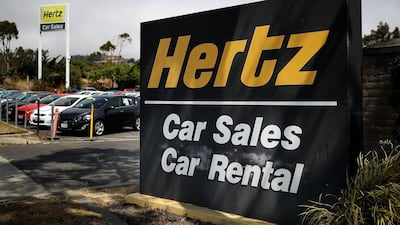Hertz, the car-rental company founded with a dozen Ford Model Ts over a century ago, filed for bankruptcy late Friday after sweeping travel restrictions and the global economic collapse destroyed demand for its vehicles.
The Chapter 11 filing in Delaware allows Hertz to keep operating while it devises a plan to pay creditors and turn the business around. The second-largest US car rental company does not need debtor-in-possession financing for now because it has more than $1 billion (Dh3.67bn) cash on hand
Hertz’s court petition listed about $25.8bn in assets and $24.4bn of debts, and its biggest creditors include IBM and Lyft. After the coronavirus pandemic decimated revenue, the company sought relief from lenders and a bailout from the US Treasury Department. But while it managed to negotiate a short-term reprieve from creditors, it wasn’t able to work out longer-term agreements.
“With the severity of the Covid-19 impact on our business, and the uncertainty of when travel and the economy will rebound, we need to take further steps to weather a potentially prolonged recovery,” Paul Stone, Hertz’s chief executive, said in a statement. The
Estero, Florida-based company named him its fifth CEO since 2014 just four days before the bankruptcy filing.
Analysts have warned of ramifications for the broader auto industry from a Hertz bankruptcy. The company has a fleet of about 400,000 cars in the US that are not subject to repurchase agreements with vehicle manufacturers and could be liquidated, Michael Ward, an analyst at Benchmark, wrote in a report last week.
“The risk for the auto sector occurs if the creditors of the debt that is secured by the vehicles decides to liquidate the fleet to repay the bonds,” Mr Ward wrote on May 14. The impact those sales may have on used-car prices could be minimized by the sale of those vehicles taking place over the course of several months, he said.
Hertz said it has enough cash for now to support its operations, which include Hertz, Dollar, Thrifty, Firefly, Hertz Car Sales, and Donlen. But it might need to raise more, perhaps through added borrowings while the bankruptcy process moves forward.
The Chapter 11 proceedings involve the company’s US and Canadian subsidiaries but do not include its international operations in Europe, Australia or New Zealand.
“Hertz may have little choice but to scale down its operations and sell assets to pay down its significant secured debt,” Joseph Acosta, a partner in the bankruptcy practice at law firm Dorsey & Whitney, said. “Hopefully, the restructuring expenses will not bury the company in the process.”
The company began laying off workers to preserve cash in March as emergency measures to contain the virus halted business and leisure travel. Hertz disclosed on April 29 that it had missed substantial lease payments related to its rental cars.
While all travel-related companies have been hurt by the pandemic, a big part of what’s weighed on Hertz is its strategy of owning or leasing a large portion of its fleet outright instead of acquiring them through buyback agreements with manufacturers. Hertz typically responds to falling demand by selling cars from its fleet, so it has been hit especially hard by the drop in prices at used-car auctions.
White & Case is the company’s legal adviser, Moelis & Co. is the investment banker, and FTI Consulting is providing financial advice. Billionaire investor Carl Icahn holds a 39 per cent equity stake.
Hertz, originally known as Rent-a-Car, was founded in Chicago in 1918. It was operating in 12,400 locations worldwide as of February.

